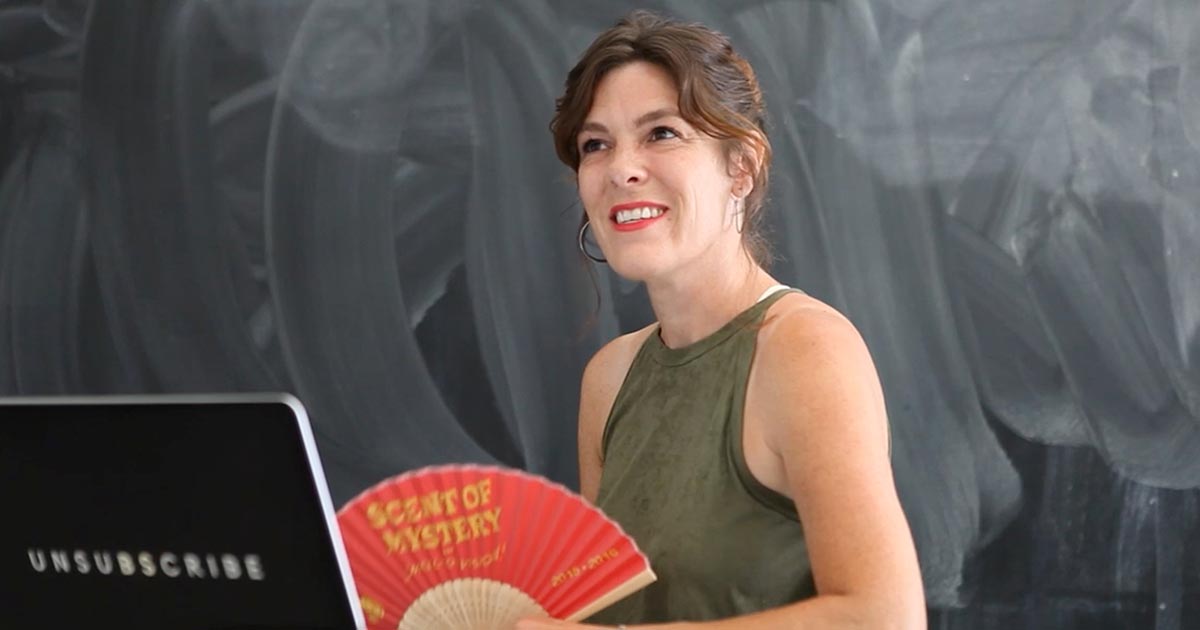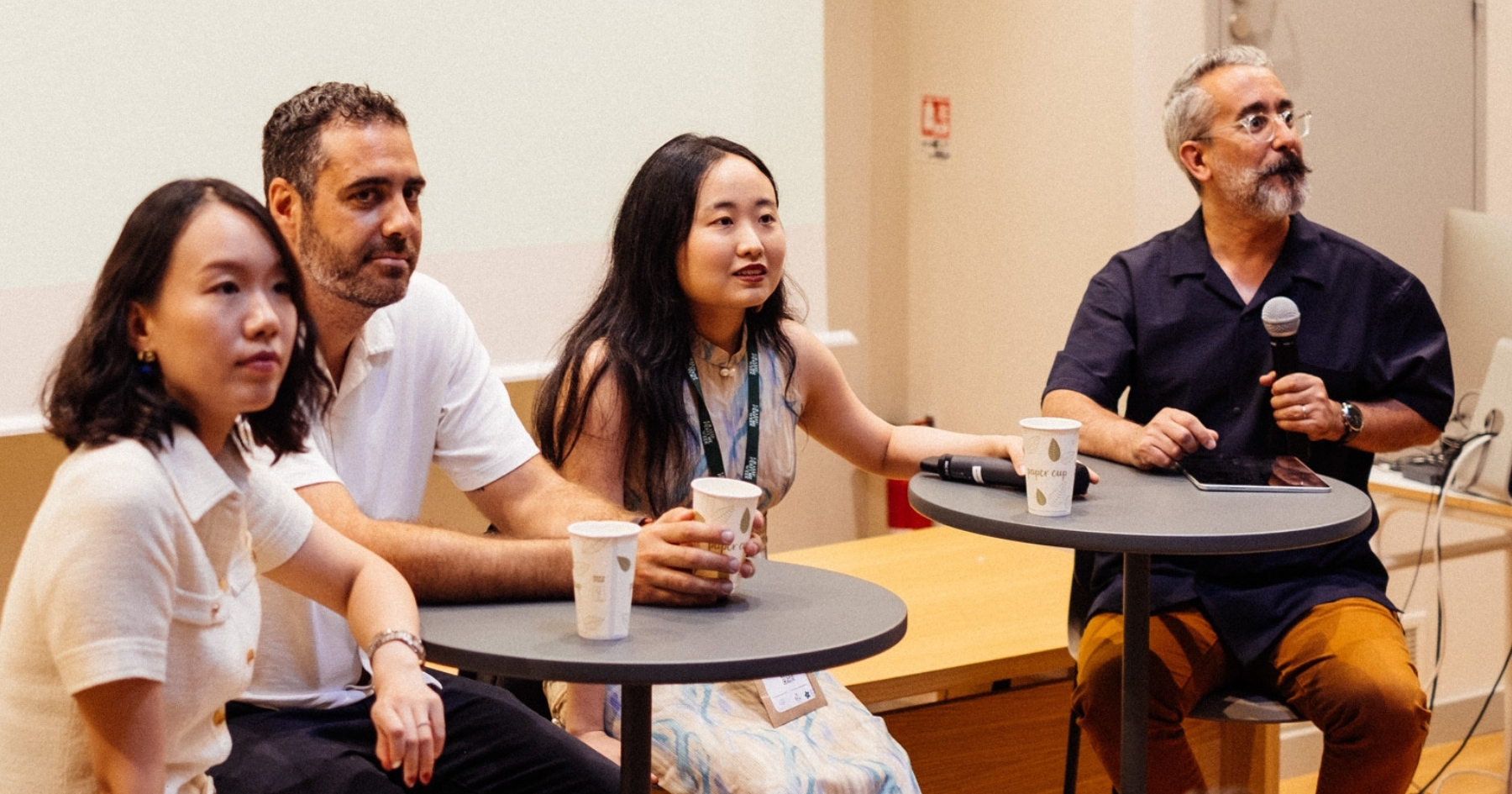Cette publication est également disponible en :
Français
Director and founder of the Institute for Art and Olfaction in Los Angeles, Saskia Wilson Brown is deeply engaged in open access and transmedia practices. As a producer and curator for visual art and film, She co-directed the Silver Lake Film Festival and has consulted on a number of arts, film and transmedia projects. The Institute for Art and Olfaction, founded in 2012, is a non-profit arts organization devoted to experimentation and education in perfumery. Through this structure, Saskia Wilson Brown has launched partnerships with institutions such as Goethe Institut, Hammer Museum, Getty Institute, Huntington Library, and many more. In 2013, she launched the Art and Olfaction Awards, an awards for independent, artisan and experimental perfumers, which she has produced in Los Angeles, Berlin, London and Amsterdam. We interviewed her about her work and issues of diversity, equality and inclusion for our article “All inclusive”: Perfumery confronts inequalities in the eleventh issue of Nez, and here’s the full transcription of our interview.
How did you conceive the idea of the Institute for Art and Olfaction?
For a long time, I worked for the film industry. I was passionate about perfumes and I noticed that perfume culture is shockingly inaccessible compared to film culture. But people have a right to learn about it! I was also preoccupied by questions of representation. The way perfume is presented in the US is very French-centric, but every country has a history of perfume, and this history is rarely represented in advertising and shops. Moreover, France is not only fancy ladies drinking coffee! Why is the European heritage valued so much in perfume? I thought it was necessary to formulate this question and go further than the Euro-centric cultural narrative, so I opened myself to other narrations. I’m not terribly in love with capitalism in general, so I was looking for other approaches to working with smell than commercial perfumery, like olfactory art. Our world doesn’t stop at buying fragrances, as a product perfume is great of course, but why stick to only one approach among many others?
You spoke about representation, which leads me to the concerns about inclusion and diversity that are getting more and more attention lately around the world. The movement seems to have started in the US, how did you deal with it?
The US is struggling with its own racist narrative right now. The country is often described as a nation of immigrants, which it is after the decimation of the Native Americans. We’re a former colony of England, we had slavery, and now we have a difficult national identity. The Trump administration stirred up issues of national identity, and the murders of Black people by the police have created a feeling of rage and frustration that is spreading everywhere, including in the perfume industry.
The American protest culture is being exported, but the US isn’t the world and people notice there’s room for change everywhere, in different ways. This will happen if some people who have an open mind, students or others, lead the charge and rise up.
We talk a lot about diversity and inclusion, but how do you define them in the light of contemporary events?
It’s tricky. My father’s Cuban; in the US, I’m considered partially a person of color, but I was raised as a white girl in France. Diversity and inclusion, at its best, is making sure voices that have not been heard to the degree other voices have are heard. But who’s deciding who these unheard voices are? That’s why it gets more complicated, if you see a board of directors consisting of white men and you think “what a bunch of white guys” you don’t know what their backgrounds are, it can be diverse in what they believe, the social class they come from… It’s complex. The way we approach it is: when there’s an opportunity to give a platform to a person who says something or represents something that has not been adequately represented, we give it, but not to the exclusion of anyone else. We’ll never say “no more French perfumers”, they are welcome! The perfumers from Texas also, and we try to present them as equals. We present all the narratives as valid and equal narratives. If we start to tick boxes and ask ourselves if we have enough, for example, “latino perfumers” or “native perfumers”, we would end up crazy. Also, it would be a disservice to everybody, and potentially taking the risk of alienating people because of their color or sexuality. So let’s be more reasonable, make space for everybody, present them equally and hope that this message helps some change. It’s really hard and tricky, we don’t want to be patronizing.
In your work, have you met perfumers or apprentices who were struggling to enter the industry because of discrimination?
This is who I meet, people who didn’t enter the industry. Why didn’t they succeed? It’s always difficult to say. The perfume industry is very selective, there’s not enough room for everybody. I also didn’t succeed to enter this industry, not because I’m a person of color but because I don’t fit the profile, I didn’t study the right thing beforehand. This is why the Institute’s perspective on this question can be summed up this way: “forget trying to join in an industry that shuts you, there’s plenty of other ways to do this, you don’t need to try to knock down the doors of companies that won’t have you. Create your own company, create a parallel space, it’s easier!“ We don’t try to change the industry, it does what it does and it does it very well. It’s not our problem, it just doesn’t represent what we stand for. We try to empower people who want to create their own structures. Why would people want to be part of a club that doesn’t want them? I don’t say that to discourage people from the industry, I have a lot of friends working for big companies and I love them, they do wonderful work.
Do you think we need some sort of “Salon des Refusés” of olfactory culture?
We are the Salon des Refusés! And for every academy artist, you need one in a Salon des Refusés, for every Cannes festival you need a Sundance festival of independent movies, that’s what moves culture forward eventually, not only the blockbusters.
Imagine the impressionist movement: the things that define it are not the paint brands the artists are using or the patrons, it’s the work. It’s the same at this institute, we focus on the openness of the culture rather than on the captive molecules released by so and so, there’s much more to it than that.
Do you see this culture evolving?
The problem of the culture around perfume is that the stories have been written by the companies. There are plenty of beautiful stories but we don’t have an independent record of what happened. And if you don’t know what people have really done, you’re doomed to repeat yourself over and over, this is why history is so important. Only in the last few years have I noticed a real progression, now people aren’t proposing the same olfactive ideas. Due to my position, of course, I have ideas proposed all the time, and I tend to hear the same ideas over and over. But sometimes you can get a record of scent culture, and interests are changing, thanks to Nez and other initiatives!
The industry’s narratives, on the other hand, haven’t changed all that much. In the current context, unfortunately, certain inequalities are embedded. Capitalism is a source of social injustice, and the perfume industry is capitalist. But within this situation, certain things are possible, and the development of independent creators is a sign of this. There’s a lot of artists working with scent as a concept, outside of perfume.
Do you think that the human problems surrounding the supply of raw materials (such as vanilla from Madagascar or ylang-ylang from the Comoros), in particular the inequalities between Western firms and farmers in developing countries, can be reduced through the process you describe?
We can’t solve capitalism’s problems, but the naïve answer is that it’s only a problem if you think that these raw materials are all you need to work with scents. If you have to buy materials which are produced by people who are exploited, it is indeed a problem, but if you look at the history of perfumes, for a long time people have been working with materials that are local to them, and processing them in simpler ways. Maybe they’re not IFRA compliant but it is still a valid way of working with scents. The perfumes from the Aztec or the Navajo reservations are not less “real” than the ones produced by the industry today, they deserve the same attention. So, there is an alternative, which is to go back to traditional methods; the challenge there is that it’s against the competitive trends. While I say that, I’m still excited about new molecules and new technologies! Ideally, people have to understand the various ways of working with scents and pick the one that works for them. There are options, which is quite encouraging, because strong options allow for a strong culture.
What else could be done to make olfactory culture even better?
The industry moves slowly because there’s a lot of people in it, but the independents are changing things really fast. What can be done is encourage these people, and tell them they are entitled to work with scents and express themselves. We also have to remember that this is a big world, there’s room for everybody. It doesn’t have to be exclusive; it can be inclusive and just as amazing!
- Institute for Art and Olfaction website: www.artandolfaction.com
- Follow the Institute for Art and Olfaction on Instagram : @artandolfaction
—
“All-inclusive”: Perfumery confronts inequalities – Summary
- Introduction, by Clément Paradis
- Shabnam Tavakol: “There is a problem of diversity, equity, and inclusion in perfumery”
- Shyamala Maisondieu: “I had to make my own voice heard”
- Chantal Artignan: “Our school should not be reserved for a social elite”
- Alessandra Tucci: “If the perfume industry wants to see more diversity in its teams, it can only happen through education”
- Saskia Wilson Brown: ”Only diversity can allow for a living culture“
- Mieke Van de Capelle: “We need to help students who want to pursue a career”








Comments